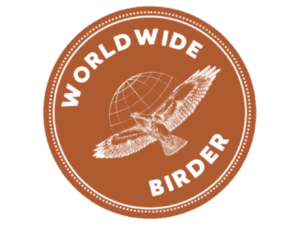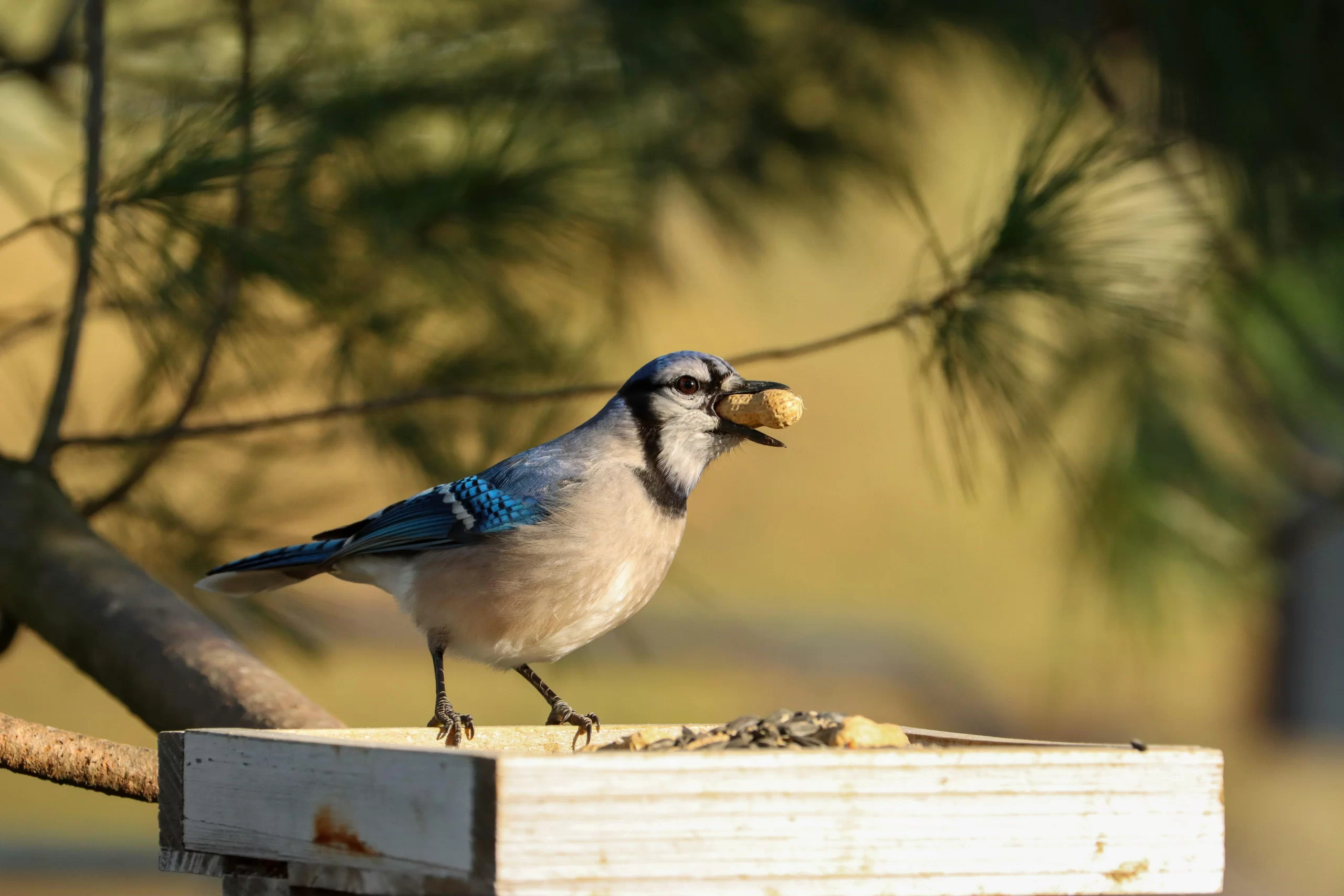Blue Jays are instantly recognizable across their range thanks to their dazzling blue coloration and distinctive mohawk. Those who enjoy feeding birds throughout the range of a Blue Jay can tell you that these creatures are regular visitors. Despite this regularity, many are not sure about what Blue Jays eat. The diets of these birds away from bird feeders are even more of a mystery. So, what do Blue Jays eat in the wild?
Well, if you’re interested in knowing about a Blue Jay diet, you’re in luck! I’m going to be going through an extensive list of food items that are supposedly eaten by Blue Jays, and I’ll tell you if Blue Jays truly eat these foods. So, what do Blue Jays like to eat? Let’s find out!
Table of Contents
What Do Blue Jays Eat?
Are Blue Jays carnivores or are they herbivores? Addressing this question is often the first step in describing an animal’s diet, and in the case of Blue Jays, these birds are both carnivorous and herbivorous! In other words, they are omnivores. Now, this still does not address the food that Blue Jays eat, so let’s look into that. What do Blue Jays eat?
Broadly, Blue Jays eat various nuts, seeds, insects, small animals, and carrion. Many people know that acorns are one of the favorite foods of Blue Jays, and a single Blue Jays may plant hundreds of acorns annually.
Now that I’ve provided a general answer to the question, “What do Blue Jays eat?” is time to take a more in-depth look at a Blue Jay diet and discuss some specific components. For starters, do Blue Jays eat birds?
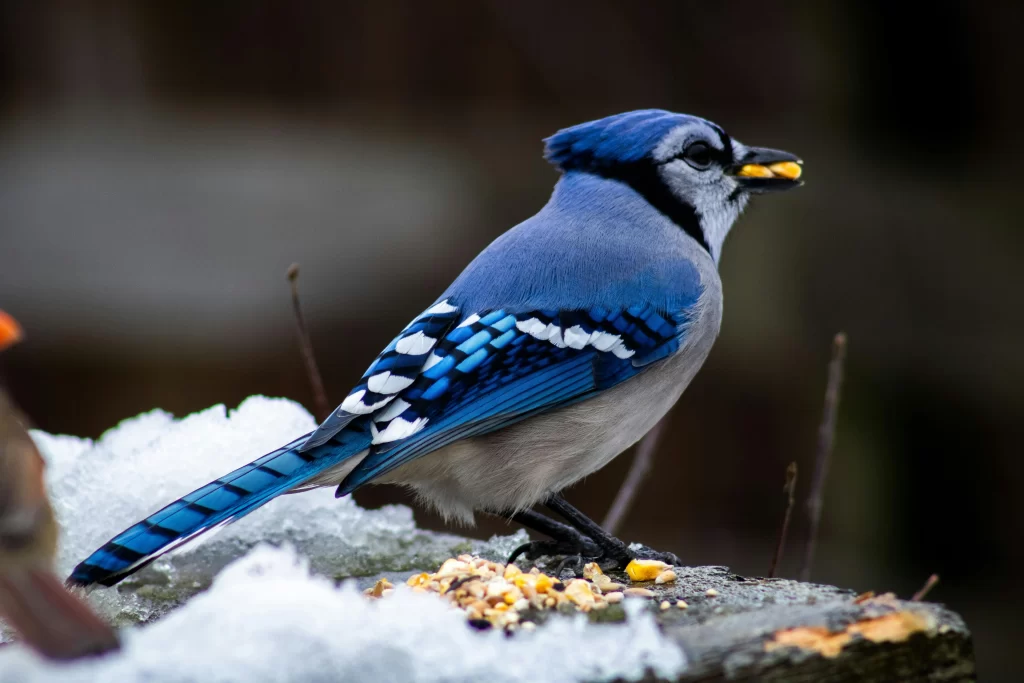
Do Blue Jays Eat Other Birds?
The idea of Blue Jays eating other birds may sound silly but remember that they’re in a family with crows – a group of birds that routinely eat their feathered counterparts. Considering that other corvids occasionally eat birds, do Blue Jays eat other birds?
Yes, Blue Jays may eat other birds, but such an occasion is very rare. During the instances in which a Blue Jay consumes another bird, the bird is typically dead or injured by the time a Blue Jay finds it. If we were to consider the question, “Do Blue Jays kill birds that are healthy adults?” then the answer is no. However, Blue Jays may pick off vulnerable birds.
Do Blue Jays Eat Hummingbirds?
Hummingbirds are beloved backyard guests who feed from flowers like petunias while gracing birders with their beauty. The last thing anyone would want to see is a hummingbird getting harmed by a creature such as a Blue Jay, so is such an event possible considering that Blue Jays occasionally eat birds? Do Blue Jays eat hummingbirds?
No, Blue Jays will not harm adult hummingbirds, as these dazzling creatures are simply too fast and nimble. Even known bird eaters like hawks struggle to capture these swift birds. While Blue Jays are harmless to mature hummingbirds, baby hummingbirds are not necessarily safe.
Do Blue Jays Eat Baby Birds?
We know that it’s basically unheard of for a Blue Jay to eat a healthy adult bird. However, baby birds are susceptible to attacks from a wide array of predators since they’re often essentially helpless. Are Blue Jays among the many predators of baby birds – do Blue Jays eat baby birds?
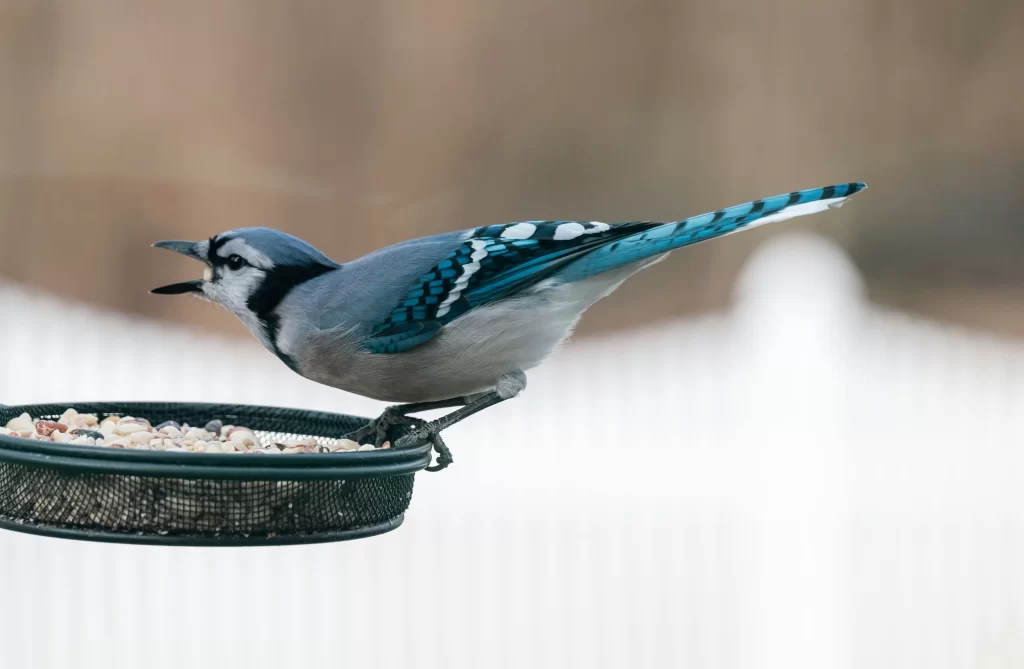
Yes, Blue Jays will eat baby birds occasionally. This is a big reason why many consider Blue Jays to be mean birds. However, don’t go hating Blue Jays just yet. Although baby birds may be incorporated into a Blue Jay diet at times, they are an infrequent snack rather than a consistent treat.
Overall, it is rare for Blue Jays to eat baby birds despite the dozens of videos depicting them eating these helpless creatures.
Okay, we know that birds are rare additions to a Blue Jay diet, so let’s investigate some other creatures. What do Blue Jays eat other than an occasional bird?
Do Blue Jays Eat Mice?
Most animals find it difficult to pass up on a delicious mouse meal. Magpies, which are close relatives of Blue Jays, will happily eat mice. Therefore, do Blue Jays eat mice when given the chance?
Yes, Blue Jays are among the many birds that will eat mice. A Blue Jay will gladly scavenge a dead mouse, but it will also kill a live mouse if a good opportunity arises. Blue Jays will deliver killing blows to these creatures with their powerful beaks before consuming them.
Do Blue Jays Eat Lizards?
A variety of lizards can be found across the range of Blue Jays. In places like Texas and Florida, lizards will be numerous and abundant, but they will be scarce in Canada and the northern United States. Still, it’s fair to wonder if Blue Jays consume lizards when given a chance. Do Blue Jays eat lizards?
Yes, Blue Jays do eat lizards! These crested birds will scavenge dead lizards and sometimes attack live lizards. Several videos depict Blue Jays capturing a lizard before flying off with it and bludgeoning it at a perch in a tree. Although it is not common for Blue Jays to eat lizards, it does happen.
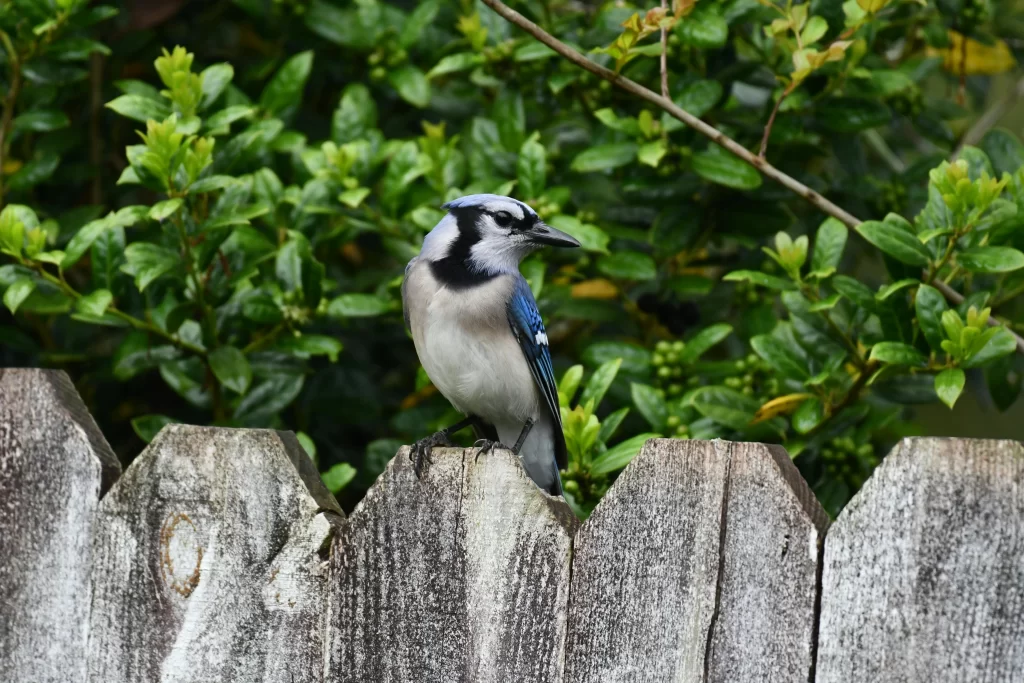
Do Blue Jays Eat Snakes?
Snakes can be difficult quarry for birds to subdue given that many of them are venomous or substantial in size. Still, they are routinely enjoyed by birds such as herons and a variety of raptors, but what about Blue Jays? Do Blue Jays eat snakes?
Yes, Blue Jays do eat snakes! A YouTube search about this query will yield some impressive videos of Blue Jays defeating small snakes and enjoying their kill. Of course, Blue Jays are very limited to eating tiny snakes. Moreover, these birds are not flying around specifically targeting snakes. Rather, Blue Jays will opportunistically eat these reptiles in rare instances.
Do Blue Jays Eat Wasps?
Wasps are pesky insects that are enjoyed by few people. There’s no question that birds such as Purple Martins love to eat wasps, but what about Blue Jays? Do Blue Jays eat wasps?
Yes, Blue Jays do eat wasps! These corvids show little fear when attacking wasps, as they will fly over to a wasp nest and devour adults and larvae. Blue Jays do not consume massive numbers of wasps, but they regularly enjoy a protein-packed wasp snack.
Do Blue Jays Eat Worms?
When we consider birds that eat worms, most people will picture something like an American Robin rather than a Blue Jay, but should these corvids receive consideration? Do Blue Jays eat worms?
Yes, Blue Jays do eat worms! Worms are an easy meal for many birds, so it’s difficult to pass up on such an easy opportunity for a snack. Blue Jays like to incapacitate worms before eating them, so they’ll attempt to bludgeon them or thrash them around before swallowing them.
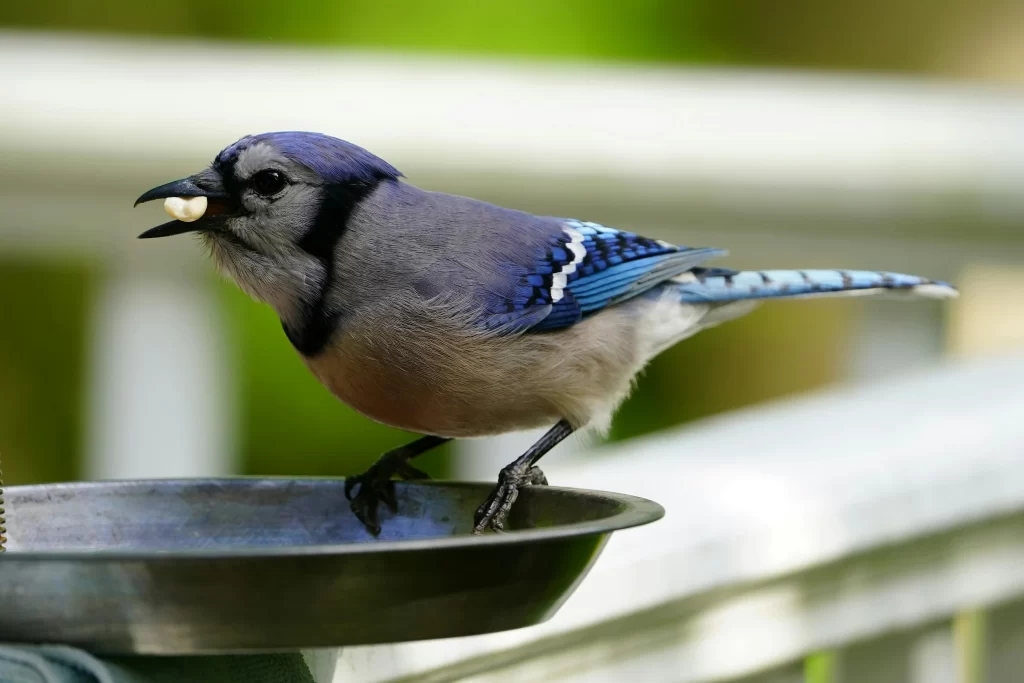
Do Blue Jays Eat Grasshoppers?
Grasshoppers are more challenging prey for Blue Jays to locate compared to wasps and worms, as they blend in seamlessly with their surroundings. Still, it’s fair to wonder if grasshoppers are included in a typical Blue Jay diet. Do Blue Jays eat grasshoppers?
Yes, Blue Jays do eat grasshoppers! However, it seems that grasshoppers are a rare meal rather than a consistent snack. Indeed, Blue Jays don’t often eat grasshoppers since they have a solid exterior that covers much of their body, making it somewhat challenging for Blue Jays to eat them.
Now, let’s turn our attention away from live creatures and focus on plant matter. What do Blue Jays eat when they’re not consuming other animals?
Do Blue Jays Eat Peanuts?
Peanuts are a food that is widely used at bird feeders because many birds enjoy them so much, but it’s fair to wonder if Blue Jays are interested in peanuts. Do Blue Jays eat peanuts?
Absolutely! Peanuts are one of the favorite foods of Blue Jays! Yes, Blue Jays will enjoy whole or shelled peanuts when they’re offered at bird feeders, but make sure the peanuts aren’t salted, as salt is not a good thing for birds.
Do Blue Jays Eat Fruit?
Birds like parrots are probably the first birds that you consider when thinking of fruit-eating birds. However, there’s reason to wonder if Blue Jays should be included among the birds that eat this sweet food. Do Blue Jays eat fruit?
Yes, Blue Jays do eat fruit! So, what do Blue Jays eat in terms of fruit? Well, it seems that a variety of fruits are enjoyed by these corvids. Blueberries, plums, mangoes, bananas, blackberries, and many more fruits are consumed by Blue Jays.
